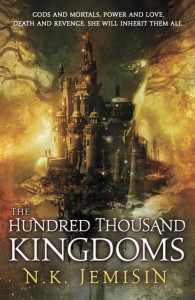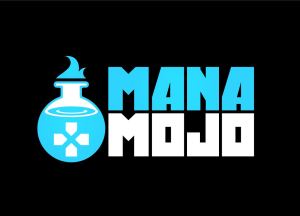 Welcome to the tenth instalment of Dust Jacket and the fifth and final review of the 2011 Hugo Award nominees. This week, we delve into mystery, court intrigue and a healthy dose of mythology as we look at N.K. Jemisin’s The Hundred Thousand Kingdoms, book one of The Inheritance Trilogy.
Welcome to the tenth instalment of Dust Jacket and the fifth and final review of the 2011 Hugo Award nominees. This week, we delve into mystery, court intrigue and a healthy dose of mythology as we look at N.K. Jemisin’s The Hundred Thousand Kingdoms, book one of The Inheritance Trilogy.
We’re in the home stretch now, wrapping things up in anticipation of Saturday night’s awards ceremony. I’m joined by my co-conspirator and world’s harshest critic, Luke.
WHAT YOU NEED TO KNOW
Yeine Darr is ruler of the northern barbarian lands of Darr, an area isolated both politically and physically from the rest of the Hundred Thousand Kingdoms. Her mother, Kinneth, was a member of the ruling Arameri family and former heir to the throne of the Kingdoms, who abdicated to marry her father. This led to a shism between Kinneth and Dekarta, Yeine’s grandfather and ruler of the world, who disowned her.
Shortly after Kinneth dies under mysterious circumstances, Yeine is summoned by her grandfather to the majestic floating city of Sky, where she is named heir to the throne. There’s a catch, however; her two cousins, the sadistic Scimina and the inebriated Relad, are also heirs, and only one can ascend to throne. Yeine is suddenly fighting for her life in a dangerous three-way power struggle.
Sky is not merely home to the ruling class of the Kingdom; the Gods themselves are imprisoned there, forced to serve as slaves to the ruling Arameri family. These Gods have a plan for Yeine, something they’ve been building to for decades.
Yeine wants nothing to do with the Kingdoms, the throne or the machinations of the Gods. She merely seeks the truth about her mother’s death. As she struggles to survive, she draws ever closer to learning not only the secrets of her family history, but also the truth about herself.
WHAT WE THOUGHT
RICHO: A small confession before we begin the review in earnest; I’m not a huge fan of fantasy novels. Too many of them attempt to follow the basic quest formula mastered by Tolkien in the Lord of the Rings trilogy, but most fail to reach the literary heights of that series. Far too often, these books come across as nothing more than formulaic re-treads, or in the case of novels like Swords of Shannara, cheap imitations.
There is a sub-genre of fantasy, though, that often piques my interest; the court intrigue novels. The wheeling and dealing of nobility, the plotting and scheming of royalty, the back-stabbing and assassinations; for some reason, I have far more time for these kind of stories. The Hundred Thousand Kingdoms falls squarely into this category.
Jemisin draws us into the story with a simple yet effective hook; Yeine is appointed potential heir to the Hundred Thousand Kingdoms, if she can survive the machinations of her rival cousins. The stakes are high; either she survives to become ruler of the world, or she dies at the hands of a court assassin. Yeine is a classic stranger in a strange land; removed from the comforts of home, thrust into a completely alien environment, separated from any familiar faces, then presented with an instant, potentially-fatal threat. It’s difficult not to relate to her plight, or at least feel some level of sympathy towards her.
LUKE: Yeine’s strength as a character is her vulnerability. Yes, she comes from a society of warrior women. Yes, she carries a knife and stabs a god in the earlier chapters (in defence of the child Sieh). Yes, she’s driven to solve her mother’s murder and right what she perceives to be a wrong. But what makes her likable, what makes her accessible, is the fact that she is open to manipulation by those around. She can be hurt. Jemisin is not trying to create a post-modern, post-ironic, post-content superwoman (even with Yeine’s later connection to the gods). Yeine is instead a victim of her situation. Her Grandfather and the city of Sky consider her an outcast. The gods see her as a tool to regain their honour and power. Her cousins see her not as a threat to their ascension, more as an insult to the family title, an affront that should not be named as possible heir, and thus should be wiped out. Reluctance is another key attribute. All Yeine wants is to uncover the truth about her mother’s death, and to make sure her own province (Darre) remains undisturbed. She, herself, doesn’t want to be named heir.
Her complexity as a character comes from the relationships she forges, particularly with Nahadoth. Naha, the nightgod, is a character who by rights she should hate. He tries to kill her on their first meeting, after all. And some mention must be made of the ambiguous sequence in chapter nineteen. After becoming physically involved with courtier (and distant cousin) T’vril, Nahadoth forces himself upon her. But instead of writing just an ugly rape scene, Jemisin has Yeine submitting (against her better judgement) to Nahadoth’s advances and finding pleasure during the encounter. Even though Yeine has admitted to us her attraction to Nahadoth, this is not a love scene. Yeine’s actions at the end certainly paint towards her uncertainty both in what has just happened, and her feelings towards Naha (I told myself for the rest of the night that I was still trembling because of fear, nothing else). Yet she feels some empathy towards him. He’s trapped against his will, ordered to carry out the bidding of the royal family and the citizens of sky. A plaything, as she feels herself.
RICHO: Yeine, of course, wants nothing to do with the court intrigue she’s thrust into. She seeks answers to her mother’s death. Like a classic mystery character, she begins her investigation, searching for clues, interviewing or interrogating those around her, and relentlessly pursuing answers to the questions that plague her. In some respects, her origins lie less in the fantasy genre and more in the style of an Agatha Christie character. For me, this was an effective tool in drawing me into the story and the world Jemisin has created, and allows Jemisin to impart some of the more complex ideas behind her world as fragments of a puzzle, so as not to overload the reader.
LUKE: She’s not really an Agatha Christie character in my opinion. She’s not so impressed with her intellect and much of her story is about learning how to fight against the schemes of her cousin (which gives her the edge over Poirot and Marple). The problem with the mystery is that it’s not particularly tantalising. A good mystery has to pique the imagination. Possibility and probability become key factors. The discovery has to be both illuminating and surprising to both character and audience, and I never found the answers Yeine uncovers about her mother to be all that interesting. Yes, it’s personal for Yeine, and she is going to be surprised. But, given what’s been set up about both the world and its inhabitants, her mother’s character and behaviour (to say nothing of whether or not she was murdered, and if so, by whom) was never all that surprising. The mystery surrounding Yeine’s involvement with the Gods, however, is far more intriguing because it involves the unfamiliar and it raises questions: How did that happen? What are the gods up to? Why do they need Yeine? Possibility. Yeine’s investigation into her mother comes across at times as backstory. Yeine’s involvement with gods gives rise to the possibility as to where the book might be going.
RICHO: The real appeal of The Hundred Thousand Kingdom, however, lies in Jemisin’s world building. She has created a truly fascinating reality, intrinsically tying court intrigue and magic with a complex but grounded mythology. This mythology forms an integral part of the novel, and helps elevate it above a standard murder mystery and into a multifaceted and intriguing tale. The Gods are intrinsic to the story, and their characterisation is flawless. They are forces of nature, powerful but flawed, and reflective of the humans they moulded in their likeness. They add greater depth to the story, allowing for some exploration of metaphysics amongst the more earthly concerns of the kingdom and it’s heirs.
LUKE: The great thing about the mythology is how genuine it feels. It feels like a real belief system and as such resonates on a much deeper level. Nahadoth at times reminded me of Lord Yama from Zelazny’s Lord of Light. Both are cold, aloof gods who are at times in control of their actions, at other times victims of the machinations. But this victimization never diminishes their darkness or their level of danger.
RICHO: Jemisin’s writing style is interesting, although sometimes frustrating. Yeine narrates the tale, attempting to reconstruct her memories of events as she narrates. It’s an effective tool in giving us greater insight into her thoughts and feelings, although there are times where the lack of narrative flow is distracting. In many ways, there’s a naivety to the writing, but it works relatively well as a reflection of Yeine’s own naivety.
LUKE: What’s refreshing is Jemisin’s sense of Brevity. No long winded pieces of superfluous description. No huge amounts of exposition (although lots of information about the world and its history/mythology is conveyed). She gets on with things. Whilst her structure can be distracting, it does keep the narrative from getting boring and conveys Yeine’s own sense of confusion.
RICHO: Overall, Jemisin has created a fascinating world and constructed an entertaining story within that world. While there are some problems with the novel, it managed to hold my attention, and I’m interested enough to read the sequels when they’re eventually published. A rare feat amongst fantasy novels. 3 Lukes.
LUKE: I would’ve liked more interesting revelations about her mother and more focus on the inheritance plotline early on. But it’s an interesting world, relying more on intrigue than magic, populated by complex characters. 3 Lukes.
IS IT HUGO WORTHY?
RICHO: The Hundred Thousand Kingdoms is easily the strongest and most enjoyable of the five nominated novels, and worthy of winning this year’s award. It held my interest in a way that the other books failed to. In a stronger year it wouldn’t make the grade, but given the dearth of adequate competition in 2011 it gets my vote. Unfortunately, I don’t think it will win, as I’m willing to bet the inferior Blackout/All Clear gets the nod.
LUKE: I think it deserves to win over this year’s nominees. But I don’t think its Hugo Worthy per se. A Hugo Worthy book needs to be a 4 or 5 Luke novel. It’s the best novel on the list, but Jemisin probably has a worthier tale in her. Whether it will win is another matter. If Blackout doesn’t win, then it will most likely go to The Dervish House.
WHAT DO YOU THINK?
Well, that wraps up our look at this year’s Hugo Awards nominees. Both Luke and I have agreed that The Hundred Thousand Kingdoms was the strongest of the five novels reviewed, but neither of us thinks it will win over Blackout/All Clear or The Dervish House. What do you think? Send us your comments, criticisms and, most importantly, your votes! Help us compile the definitive list of Greatest Sci-Fi Masterpieces.
THE RANKINGS
The hundred Thousand Kingdoms tops our list of Hugo nominees, but can’t manage to rise above the classics we’ve reviewed to date.
TITLE AUTHOR RANKING
1 Foundation series Isaac Asimov 4.5
1 The Forever War Joe Haldeman 4.5
2 The City and the Stars Arthur C. Clarke 4
3 Non-Stop Brian Aldiss 3.5
4 Player of Games Ian M. Banks 3.25
5 The Hundred Thousand Kingdoms N.K. Jemisin’s 3
6 Cryoburn Lois McMaster Bujold 2.25
7 Blackout Connie Willis 2
8 The Dervish House Ian McDonald 1.5
9 Feed Mira Grant 0.5
BEHOLD…THE FUTURE!
Join us in two weeks as we write a fitting epilogue to Hugo Month at NPC with a look at last year’s co-winner, Paolo Bacigalupi’s The Windup Girl. See you then.








